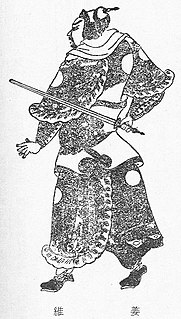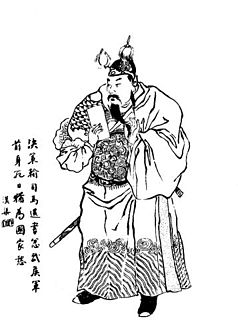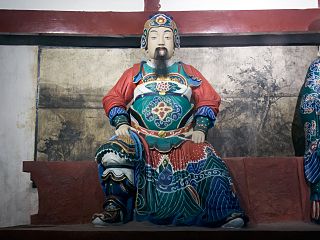
Jiang Wei, courtesy name Boyue, was a military general of the state of Shu during the Three Kingdoms period of China. Born in Ji County, Jiang Wei started his career as a military officer in his native Tianshui Commandery, which was a territory of Wei. In 228, when Wei's rival state Shu launched an invasion led by Zhuge Liang, Jiang Wei was distrusted by Ma Zun, then administrator of Tianshui Commandery. As such, Jiang Wei had to defect to Shu. Zhuge Liang, the Imperial Chancellor and regent of Shu, highly regarded Jiang Wei and appointed him as a general in Shu. After Zhuge Liang's death in 234, Jiang Wei continued serving as a military commander during the regencies Jiang Wan and Fei Yi, eventually rising to the highest military rank of General-In-Chief (大將軍) after Fei Yi’s death in 253. Between 240 and 262, he continued Zhuge Liang's legacy of waging war against Wei by leading another 11 military campaigns. However, Jiang Wei's campaigns were relatively constrained in terms of both scale and duration due to Shu’s limited resources and inadequate food supplies, as well as internal political faultlines. In 263, when Wei launched a massive invasion of Shu, Jiang Wei led Shu forces to resist the invaders at Tazhong, Yinping and Jiange, himself defending Jiange which was under Zhong Hui's attack. While Jiang Wei managed to temporarily stall Wei’s main force led by Zhong Hui, Deng Ai, another military commander of Wei, took a shortcut via Yinping and showed up at Chengdu unexpectedly. Liu Shan surrendered to Deng Ai without putting up resistance and ordered Jiang Wei to surrender to the Wei general Zhong Hui; this event marked the end of Shu's existence. In the following year, Jiang Wei instigated Zhong Hui to launch a rebellion in Chengdu against the Wei regent Sima Zhao and hoped to use the opportunity to gain military power and restore Shu. However, some of Zhong Hui's officers were unwilling to participate in the rebellion and started a mutiny, killing Jiang Wei and Zhong Hui.

Zhang Fei, courtesy name Yide, was a military general serving under the warlord Liu Bei in the late Eastern Han dynasty and early Three Kingdoms period of China. Zhang Fei and Guan Yu, who were among the earliest to join Liu Bei, shared a brotherly relationship with their lord and accompanied him on most of his early exploits. Zhang Fei fought in various battles on Liu Bei's side, including the Red Cliffs campaign (208–209), takeover of Yi Province (212–214), and Hanzhong Campaign (217–218). He was assassinated by his subordinates in 221 after serving for only a few months in the state of Shu Han, which was founded by Liu Bei earlier that year.

Deng Ai, courtesy name Shizai, was a Chinese military general and politician of the state of Wei during the Three Kingdoms period of China. He is best known for his pivotal role in the Wei conquest of its rival state, Shu, in 263. He was described as a very loyal subject who made great contributions to Wei, but was also noted for his arrogance and audacity, which led to his downfall and death.

Chen Shou, courtesy name Chengzuo (承祚), was a Chinese historian, politician, and writer who lived during the Three Kingdoms period and Jin dynasty of China. Chen Shou is most known for his most celebrated work, the Records of the Three Kingdoms (Sanguozhi), which records the history of the late Eastern Han dynasty and the Three Kingdoms period. Chen Shou wrote the Sanguozhi primarily in the form of biographies of notable persons of those eras. Today, Chen's Records of the Three Kingdoms is part of the Twenty-Four Histories canon of ancient Chinese history.

Zhong Hui, courtesy name Shiji, was a Chinese calligrapher, essayist, military general, and politician of the state of Cao Wei during the Three Kingdoms period of China. He was the younger son of Zhang Changpu with Zhong Yao, who served as the Grand Tutor in the Wei imperial court. He was already known for being insightful, intelligent and knowledgeable since he was young. Zhong Hui rose to prominence in the 250s when he became a close aide to Sima Zhao, the regent and de facto ruler of Wei. He advised Sima Zhao on how to deal with the Third Rebellion in Shouchun from 257–258 and was highly regarded by the latter. With Sima Zhao's help, Zhong Hui steadily moved up the ranks and became one of the key figures in the Wei government.

Zhuge Zhan (227–263), courtesy name Siyuan, was a military general and official of the state of Shu Han during the Three Kingdoms period of China. He was a son of Zhuge Liang, the first Imperial Chancellor of Shu.

Cao Zhen, courtesy name Zidan, was a military general of the state of Cao Wei during the Three Kingdoms period of China. He was an adopted son of Cao Cao, a warlord who rose to power in the late Eastern Han dynasty and laid the foundation for Wei. After Cao Cao's death and the end of the Eastern Han dynasty, Cao Zhen served under Cao Pi and Cao Rui, the first two emperors of Wei. He is best known for leading a successful defence of Wei from the first two of a series of invasions by Wei's rival state, Shu Han, between 228 and 229.

Zhuge Dan, courtesy name Gongxiu, was a Chinese military general and politician of the state of Cao Wei during the Three Kingdoms period of China. When he held key military appointments throughout his middle to late career, he was involved in all of the three rebellions which broke out in Shouchun between 251 and 258. During the second rebellion, he actively assisted the Wei regent Sima Shi in suppressing the revolt. After the rebellion, the Wei government put him in charge of Shouchun. As the Sima clan became more powerful and established themselves as the de facto rulers of Wei, Zhuge Dan feared that he would end up slain like Wang Ling and Guanqiu Jian – the leaders of the first two rebellions – so he started the third rebellion against Sima Zhao, who succeeded Sima Shi as regent of Wei in 255. Although he received some support from Wei's rival state Eastern Wu, his rebellion was eventually suppressed by Wei imperial forces and he met his end at the hands of Hu Fen, a military officer under Sima Zhao.

Zhang Bao was the eldest son of Zhang Fei, a general who served the warlord Liu Bei during the late Eastern Han dynasty and the state of Shu Han during the Three Kingdoms period of China. Little is known about Zhang Bao's life because Zhang Fei's biography in the historical text Records of the Three Kingdoms only mentioned that he was Zhang Fei's eldest son and that he died early.
Huang Quan, courtesy name Gongheng, was a military general of the state of Wei during the Three Kingdoms period of China. He previously served under the warlords Liu Zhang and Liu Bei during the late Eastern Han dynasty and in the state of Shu during the early Three Kingdoms period before defecting to Wei. Liu Bei relied heavily on Huang Quan for counsel in both domestic and foreign policy. Under the Wei government, however, Huang Quan was restricted to only internal affairs because even though the Wei emperor Cao Pi appreciated him for his talent, he doubted Huang Quan's allegiance and believed he was still secretly loyal to Liu Bei.
Li Hui, courtesy name De'ang, was an official of the state of Shu Han during the Three Kingdoms period of China. After refusing Liu Zhang's service, Li joined Liu Bei early in his campaign to pacify Yi province. After Liu Bei's death, Li Hui proved his talents during Zhuge Liang's Southern Campaign and was appointed the area commander in the south. He set the standard for his successors, such as Ma Zhong, for sound governance. After Shu-Han's co-regent Li Yan was removed from office, Li Hui was promoted again and sent to Hanzhong to assist in the Northern Expeditions but died a year later.

Deng Zhi, courtesy name Bomiao, was a government official, diplomat and military general of the state of Shu Han during the Three Kingdoms period of China. A descendant of Deng Yu, Deng Zhi started his career in the late Eastern Han dynasty under the warlord Liu Bei as a low-level officer in Pi County. After Liu Bei discovered his talent, Deng Zhi steadily rose through the ranks to become a county prefect and later a commandery administrator and imperial secretary. In 223, the Shu regent Zhuge Liang sent him as Shu's envoy to meet Sun Quan, the ruler of Shu's ally state Wu, and reestablish the Wu–Shu alliance against their common rival state Wei. Deng Zhi succeeded in his mission and earned praise from Sun Quan for strengthening Wu–Shu ties. In 227, Deng Zhi became a military general and he participated in the first Shu invasion of Wei by leading a decoy force with Zhao Yun to distract the Wei general Cao Zhen. Although they lost the battle, Deng Zhi and Zhao Yun managed to rally their troops to put up a firm defence during their retreat and minimise their losses. Following Zhuge Liang's death in 234, Deng Zhi rose to higher general ranks and was stationed in present-day Chongqing for about 10 years before he was recalled back to the Shu capital Chengdu in his 70s to serve as General of Chariots and Cavalry. In 248, he suppressed a rebellion in Fuling. He died in 251.
Wu Ban, courtesy name Yuanxiong, was a Chinese military general of the state of Shu Han in the Three Kingdoms period of China.

The Battle of Wuzhang Plains was fought between the contending states of Cao Wei and Shu Han in 234 AD during the Three Kingdoms period of China. The battle was the fifth and last of a series of Northern Expeditions led by Shu's chancellor, Zhuge Liang, to attack Wei. Zhuge Liang fell ill and died during the stalemate and subsequently the Shu forces retreated.

Zhang Yi, courtesy name Bogong, was a military general of the state of Shu Han during the Three Kingdoms period of China. Born in the late Eastern Han dynasty, Zhang Yi was a 10th-generation descendant of Zhang Liang. He started his career as a scribe under the warlord Liu Bei, who founded Shu later, and gradually rose to the positions of a county prefect and commandery administrator. In the early 230s, he served as an area commander tasked with maintaining the peace in Shu's southern commanderies. In 234, he led the Shu vanguard during the Battle of Wuzhang Plains against Shu's rival state Wei. From 238 to 259, Zhang Yi steadily rose through the ranks to become one of Shu's top generals. During this time, although he strongly opposed the Shu general Jiang Wei's aggressive stance towards Wei, he still accompanied Jiang Wei on his military campaigns against Wei. In 263, he surrendered to Wei forces along with the Shu emperor Liu Shan when Wei launched a large-scale invasion of Shu. In the following year, Zhang Yi was killed by mutineers during a rebellion by the Wei general Zhong Hui. Like Liao Hua and Zong Yu, Zhang was one of few officials who served the Shu-Han state throughout its entire existence.
Jiang Wei's Northern Expeditions refer to a series of eleven military campaigns launched by the state of Shu Han against its rival state, Cao Wei, between 240 and 262 CE during the Three Kingdoms period in China. The campaigns were led by Jiang Wei, a prominent Shu general. Unlike the previous Northern campaigns led by Zhuge Liang, which added Wudu and Yinping commanderies to Shu Han state territories, Jiang Wei's campaigns ended up being unpopular in both the military and civil circles in Shu. Also unlike Zhuge Liang's campaigns which often featured 60,000 to sometimes even 100,000 Shu Troops, Jiang Wei's were often much smaller rarely exceeding 30,000 even after the death of Fei Yi, where Jiang Wei assumed control of the military. The Zhuge Liang campaigns did suffer from logistical and supply issues for their large army. Zhuge's successor Jiang Wan, believed that it was the Hanzhong's mountainous terrain itself that were to blame for the campaigns failures and attempted to switch the route thru the Han river. Fei Yi, who succeeded Jiang Wan, agreed, and never allowed any large campaigns to be launched by Hanzhong. Jiang Wei however overlooked these concerns and used Hanzhong as his home base as Zhuge Liang did.

The Conquest of Shu by Wei was a military campaign launched by the dynastic state of Cao Wei against its rival Shu Han in late 263 during the Three Kingdoms period of China. The campaign culminated in the fall of Shu Han and the tripartite equilibrium maintained in China proper for over 40 years since the end of the Eastern Han dynasty in 220. The conquest laid the foundation for an eventual reunified China proper under the Western Jin dynasty in 280.
Li Te, courtesy name Xuanxiu (玄休), posthumously King Jing of Chengdu (成都景王) and later Emperor Jing (景皇帝), was the spiritual founder of Cheng Han during the Sixteen Kingdoms period of Chinese history. He was a Ba-Di from present-day Gansu who, due to Qi Wannian's rebellion in 296, decided to move back to his ancestral home in Yizhou. In Yizhou, his brother, Li Xiáng joined a rebellion in 300 headed by Zhao Xin but was betrayed and killed by Zhao the following year. Li Te retaliated and drove out Zhao from Yizhou before submitting to the Jin dynasty (266–420). Li Te was beloved by the refugees of Yizhou and was sought by them after the Jin court issued an order forcing all refugees to return to their provinces despite the problems that led to their migration still persisting there. After months of evading the order, Jin forces led by Luo Shang took action in 301 and attacked Li Te. For the next two years, Li Te fought Luo Shang with consistent success, going as far as reaching Chengdu and declaring a new reign era before he was abruptly killed in an ambush in 303. Still, his brother Li Liu and his son Li Xiong would continue his war, with the latter finally forcing Luo Shang out from Chengdu in 304. Li Xiong established the state of Cheng, and posthumously honoured his father as a king and later an emperor.
Li Liu, courtesy name Xuantong (玄通), posthumously named King Wen of Qin (秦文王), was a general under Li Te and one of the spiritual founders of Cheng Han during the Sixteen Kingdoms period. He was his brother's general during his war with Luo Shang in Yizhou. After Li Te was killed in an ambush in 303, Li Liu was hastily chosen by Te's followers as his successor. He saved Li Te's army from destruction during the aftermath of his death but later decided to have his nephew, Li Xiong handle military responsibilities. Li Liu died in 303, just a few months before Cheng Han's creation in 304. Although Li Liu succeeded Li Te first, when Li Xiong became emperor in 306, Li Liu was not posthumously promoted to emperor.
Luo Shang, courtesy name Jingzhi, also called Luo Zhong, courtesy name Jingzhen, was a military general of the Jin dynasty (266–420). In 300, the Jin court appointed him the Inspector of Yizhou and sent him to quell the rebellion of the previous officeholder, Zhao Xin. However, before Luo Shang arrived in the province, the refugee leader, Li Te, had ousted Zhao Xin from power, and the two men attempted to co-exist. Due to an order from the court demanding for the refugees to be sent back to their provinces, conflicting interests led to a war between Luo Shang and Li Te in 301. In 304, Li Te's son, Li Xiong, drove out Luo Shang from Chengdu, allowing the Li clan to establish the Cheng Han dynasty in the Ba and Shu regions.













